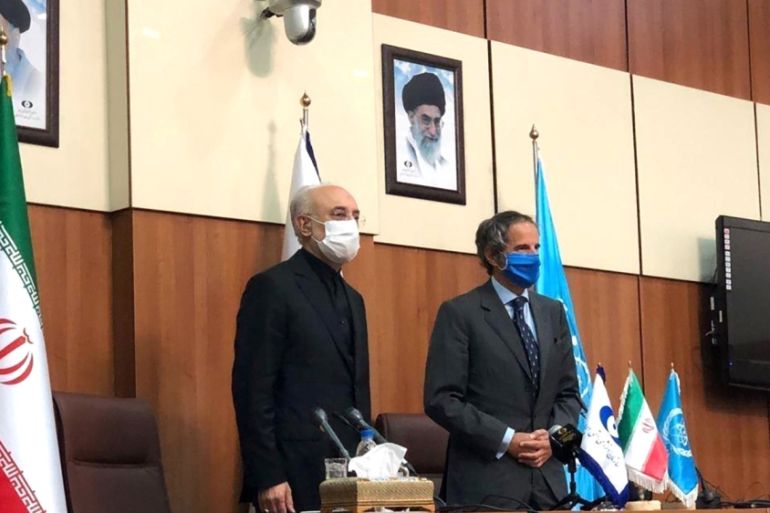Iran hails ‘constructive’ talks with visiting IAEA chief
Trip comes after US pressed the UNSC to reimpose sanctions on Tehran that were lifted under the 2015 nuclear deal.

Iran’s nuclear body says it held “constructive” talks with the visiting head of the International Atomic Energy Agency (IAEA) amid tensions over a US bid to reimpose UN sanctions on Tehran.
Rafael Grossi’s trip comes after Washington last week pressed the UN Security Council to reimpose sanctions that were lifted under the 2015 nuclear deal between Iran and world powers (the JCPOA), from which the US has withdrawn.
Keep reading
list of 4 itemsUS seeks new mechanism to monitor North Korean sanctions
Bombs and viruses: The shadowy history of Israel’s attacks on Iranian soil
Russia says Ukraine attack hits Zaporizhzhia nuclear power plant
But Iranian authorities said Grossi’s visit was not related to US moves to reimpose sanctions.
“Our conversation today was very constructive. It was agreed that the Agency will carry out its independent and professional responsibilities and Iran will fulfil its legal commitments,” said Ali Akbar Salehi, head of Iran’s Atomic Energy Organisation, according to the ISNA news agency.
“A new chapter of cooperation between Iran and the IAEA will start.”
The visit came as the president of the United Nations Security Council, Indonesia, said it was “not in the position to take further action” on the US bid to reimpose UN sanctions on Iran because there is no consensus in the 15-member body.
Indonesia’s US Ambassador Dian Triansyah Djani, council president for August, was responding to a question from Russia and China on the issue during the council meeting on the Middle East.
Thirteen council members expressed their opposition on Friday, arguing that Washington’s move is void given it is using a process agreed under a 2015 nuclear deal between Iran and world powers that it quit two years ago.
|
|
Despite the talks’ cordial tone, Al Jazeera’s Assed Baig said a contentious issue over access to two nuclear facilities in Iran remains unresolved.
In June, the IAEA Board of Governors passed a resolution putting pressure on Iran to let inspectors into its sites because they could still host undeclared nuclear material, or traces of it.
Grossi said on Saturday that he would address “the outstanding questions, in particular, the issue of the access,” which Iran has so far denied.
“Over the last few days, it looked like Iran was changing its position, and its nuclear agency said that they were ready to grant access, but under the condition that it would end questions once and for all,” said Baig, reporting from Tehran.
“That is a very vague precondition, but what we are hearing today from Iran is again asking the IAEA to act impartially and professionally,” Baig added, refering to the fact that some of the intelligence gathered on those sites has come from Israel, something that has upset Tehran.
Following his meeting with Salehi, Grossi said “there is no political approach towards Iran.”
“There are issues that need to be addressed … this does not mean a political approach towards Iran.”
On Monday, Tehran said Grossi’s visit would “strengthen ties and build trust” between Iran and the IAEA, “as long as the IAEA moves based on impartiality, independence, and distances itself from political pressure of other countries”.
“The IAEA will not let third countries impact its relations with any other country,” Grossi said, according to Iranian media.
Grossi will meet President Hassan Rouhani, the foreign minister and other senior officials during his visit.
The visit also takes place shortly before a September 1 meeting of the joint commission on the JCPOA.
The US is at loggerheads with the European signatories since Washington attempted on Thursday to invoke a punitive measure included in the JCPOA by declaring that Iran was, in fact, in violation of the agreement.
France, Germany and the UK rejected the move, stating that the US had withdrawn from the JCPOA in 2018 and as such had no standing to claim any of its measures.
Washington controversially maintains it has the right to force the reimposition of sanctions through the agreement’s “snapback” mechanism, despite its withdrawal.